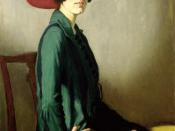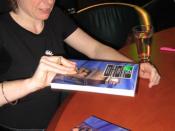Roland Barthes (1915-1980) was a celebrated writer and theoretician, generally considered as one of the leading figures in French structuralism. In his landmark essay, 'The Death of the Author' (1968) he attacked the act of examining the author's intentions as a means of understanding the text more thoroughly, 'The image of literature to be found in ordinary culture is tyrannically centred on the author'.1 Barthes believed that to attain the 'ultimate meaning'2 , the biography and psychology of the author should be cast aside by the reader and the focus should instead be on the text, 'It is language that speaks not the author.'3 In applying Barthes' theory to Virginia Woolf's 'Orlando' (1927-28) and Jeanette Winterson's 'Oranges Are Not The Only Fruit'' (1983-4) I hope to show that critics should not necessarily look to authorial intention for meaning in literature.
In the reading of both authors' work, critics tend to pay particular interest to their lives.
This is largely unsurprising as both women are of considerable interest. They have dealt with issues such as discovering their homosexuality, and whilst married in Woolf's case. Woolf met a tragic end when she drowned herself in the River Ouse and it is easy to look at her work in a different light knowing that she suffered from depression. Equally, as women writers it may be considered interesting to see how they react to being in a predominately male profession. Woolf dedicated 'Orlando' to Vita Sackville-West, her lover, and in her diary she wrote, 'One of these days, though, I shall sketch here like a grand historical picture, the outlines of all my friends...Vita should be Orlando, a young nobleman.'4 One critic described 'Orlando' as 'the longest and most charming love-letter in literature.'5 This comment appears to be entirely justified if 'Orlando' was...


